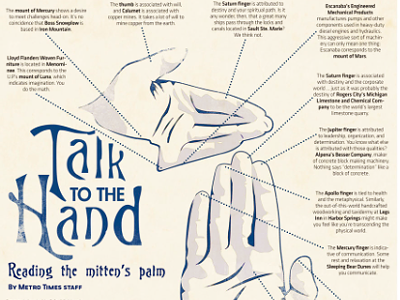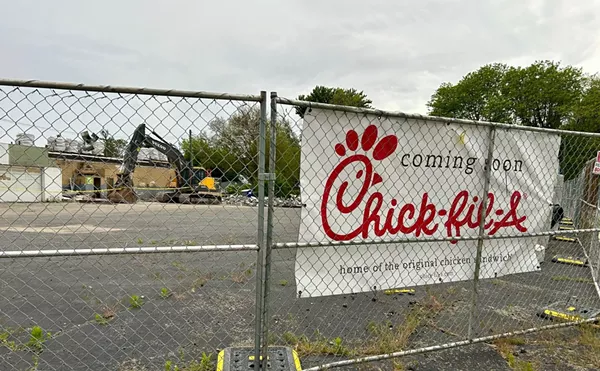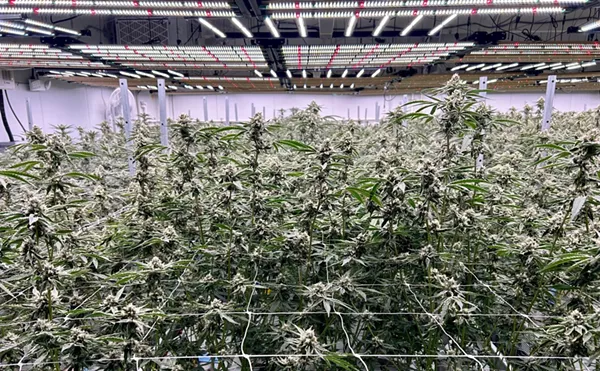
Audio By Carbonatix
[
{
"name": "GPT - Leaderboard - Inline - Content",
"component": "35519556",
"insertPoint": "5th",
"startingPoint": "3",
"requiredCountToDisplay": "3",
"maxInsertions": 100,
"adList": [
{
"adPreset": "LeaderboardInline"
}
]
}
]
Perkins Pickles
Location: Detroit
Founded: 2011
Perkins Pickles president Tom Perkins has always loved the tangy taste of a good pickle. As a kid, he says he didn't carry around a packet of Skittles, he had a jar of pickles. For Christmas, he'd get 5-gallon tubs of pickles as gifts. That love of pickles continued into adulthood, and in 2007, when he was living in Chicago working as a button-maker at the Busy Beaver Button Factory (yes, it's for real; Google will prove it), Perkins and his fellow button-makers would order pickles from different companies, trying to find the best.
"Everybody there was kind of a pickle fan, and I kept eating these pickles and I started to think, 'You know, I bet I can do this better.' So, with some urging from my colleagues at the button company, I started making pickles, just screwing around with a bunch of recipes. It just sort of evolved from there. I got a recipe I thought was pretty good, and went to the Leelanau Pickle-Off Festival with my friend's dad, who had deep pockets. And so when I ended up winning the People's Choice award, beating out 50 other companies, he sorta said, 'What's it going to take to get this started?' That was 2009, and I started going through the licensing, tweaking the recipe until just last year, when I got serious about jarring."
Rather than call his pickles "cold-pack," Perkins prefers using the term "refrigerator-style" pickles, because "people recognize it more."
Describing his process, he says, "We put pickles in five-gallon food-grade buckets on Monday, pull them out partway through the week and chop them up into bite-size pieces and put them back in the brine again until Friday, when we pull them out and jar them. It's a super-quick pickle. There's actually a style of pickle called a 24-hour dill, but this is more like a 96-hour dill, I guess. So it's all really fresh, and we make just enough to sell during the week. Every Friday we have fresh pickles coming out, so nobody gets pickles that are more than a week old. That helps keep the product cold, crisp and fresh.
Perkins' brine includes peppercorns, crushed red pepper, garlic and sugar — although he cautions that it's only a little bit sweet, "definitely not a bread and butter or sweet pickle."
"People ask me what kind of pickle it is," he says. "It's a little sweet, but it's not a sweet pickle; it's got a little spice to it. It's not quite a new dill; it's fresh like a new dill, but new dills don't use vinegar. It's basically a hybrid of a lot of different kinds of pickles."
In addition to pickles, Perkins also sells pickled garlic, taking the garlic he pickles with and letting it sit a few more weeks. Other products available from time to time include pickled green tomatoes and chow-chow, a pickled relish (Perkins prefers to call it a "slaw") made from red cabbage, green tomatoes, pearl onions, carrots and jalapeños.
With all these new pickle companies, you might think there'd be stubborn rivalries among competitors, but Perkins paints a different picture. "The pickle guys are all really nice," he says. "Some of the other food people aren't very friendly to each other, and it is cool that there are all these companies and we're all friendly and supportive, and we're all doing a little bit differently, we all kind of have our own niche, and it's cool that way. Joe McClure is actually one of the nicest guys I've come across, always offering to help me out in some way."
The Brinery
Location: Ann Arbor
Founded: 2010
Brinery honcho David Klingenberger got into farming as a high school student, after finding his way out to Tantré Farm, an organic farm doing community-supported agriculture on the outskirts of Ann Arbor. For Klingenberger, it was a great fit; he calls the farm "a pillar of the Washtenaw County local food community." After learning organic farming hands-on, he started looking for ways to extend the use of farm-fresh food by preserving it in traditional ways.
He says, "I actually started making pickles and sauerkraut because I was interested in all forms of food preservation, from tomato sauce to jam to beer to sauerkraut — and sauerkraut is one of the most ancient forms of food preservation. Before refrigeration, this was how people lived through the winter months."
In addition to pickles, tempeh and a wide variety of sauerkraut styles, Klingenberger also makes kimchi, a Korean style of pickled cabbage.
"Kimchi has become one of our most popular items. It's our take on a real classic Korean style of kimchi."
He's also using a more ancient style of pickling known as lactofermentation, fermenting vegetables in brine. The results are unusual, as beneficial bacteria living wild on the produce do the work.
"I like a good vinegar pickle," Klingenberger says, "but it's like comparing sourdough bread to quick-rise dough. It's really good."
His products are sold by the jar, cold-pack style, which means they're kept on ice when sold at farmers' markets, or refrigerated when sold in stores. Right now, he's selling pickles in 16-ounce and 24-ounce jars, and in 5-gallon buckets to restaurants.





